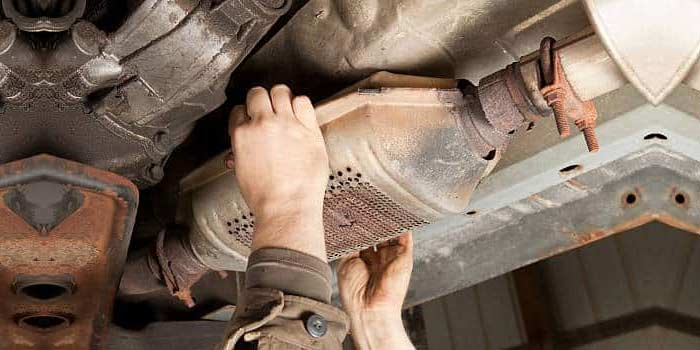
Automotive
By the 1940s and 1950s, air quality had become so poor in many of the world’s largest cities that a fix needed. This pollution caused mainly by pollutants released by motor vehicles, including photochemical smog and low-level ozone. In the middle of the 1970s, primarily in California, catalytic converters installed in vehicles to reduce air pollution despite initial opposition from the automobile industry. The use of catalytic converters has gradually increased worldwide. And today there used in every car that produced and running on the road. In some counties, driving a vehicle without a catalytic converter is illegal. So, catalytic converters have gained popularity over time.
After thorough testing with more cost-effective alternatives, precious and expensive platinum chosen for the catalysts. Platinum was more stable in exhaust fumes and more resistant to the sulfur compounds produced by the sulfur in the fuel. A device that could integrate all catalytic functions into a single catalyst realized in the 1980s, a tremendously significant technological achievement. Known as the three-way catalyst (TWC), this technology is still the cornerstone of gasoline car emissions management today.
More than a century after Frenkel’s London lecture, many obstacles remain or can anticipated as we enter the second decade of the 21st century. Engine technology will progress quickly as vehicle and engine makers attempt to improve economy and pollution emissions simultaneously. Ultimately, this will result in an engine combining the benefits of both gasoline and diesel engines.
Modern catalytic converters made of precious metals like platinum, palladium, and rhodium, making them among the most expensive parts of a car. Because catalytic converters made of precious metals, they are removed from a vehicle and recycled individually. A Catalytic converter recycling Australian company will pay you from $50 to thousands of dollars for a catalytic converter.
Are you stuck with a clogged catalytic converter? If yes, then remember that catalytic converter recycling firms like QLD Catalytic Converter are ready to offer their customers a reasonable cash amount for their catalytic converters. If you need a cheap catalytic converter, you must purchase used converters, which are available online and at recycling yards. You can used converters in good condition online, but the ones you get from a recycling company will be cheap, and in some cases, they will even come with a warranty.
Technology has advanced in recent years to the point where we can now recover platinum group metals at a rate of over 95%. This is mainly because refinery facilities like Bacmetall’s have improved. In recycling a catalytic converter, the precious metals extracted and sold in the market. Platinum is currently worth $33.4 per gram, rhodium is $397 per gram, and palladium is $53.31, and all of these three metals are found in a catalytic converter. Typically, 2–8 grams of palladium, 3–7 grams of platinum, and 1-2 grams of rhodium are found in each converter. It is pretty eco-unfriendly to obtain and prepare precious metals.
Rare metals must mined from the soil with great effort. The procedure involves several intricate steps, including deep tunnel drilling, transportation, chemical processing, etc. By recycling catalytic converters, we can reduce these processes’ environmental impact. Not only will it contribute to the sustainability of our world. But it will also boost the economy by providing ample employment opportunities.
Of course, it is, and it is, in fact, significantly better than recycling standard metal as it contains precious metals like platinum, rhodium, and palladium. Which are very difficult to extract and are available in a minimum quantity on our plate. This brings us to our first reason why recycling catalytic converters are suitable.
Reusing recycled parts eases the strain of obtaining new resources from the ground by laboriously mining them. Resource preservation is crucial because we want to ensure we can utilize them as much as possible and keep them available for as long as feasible.
In many cases, converters end up in landfills once they are no longer used. By recycling catalytic converters instead of throwing them in the garbage. You are preventing them from disintegrating into tiny pieces that might contaminate water supplies if thrown away.
As previously stated, many precious metals are found in catalytic converters and are highly valued. So, selling a catalytic converter individually to scrap Catalytic converter recycling Australian companies like QLD Catalytic Converter will highly benefit you.
Whether selling or buying, you must look for a reliable and trustworthy company. As you can get the best cash quotes. And a reasonable price tag on used catalytic converters. Always remember that there are many catalytic converter recycling Australian companies. And you must be wary of the fraudulent ones. As they provide a good cash quote but do not provide any services. And will have dozens of hidden charges deducted from the cash quote that they provide you.
QLD Catalytic converter is a renowned company that will provide the best services. A good cash quote for your catalytic converter, and a reasonable price for a used one (if you buy from them). All you have to do to buy or sell them is to get in touch with them, and they will take care of the rest. If you have any doubts or queries about them, you can contact their customer service representatives. And they will answer your call during working hours and clarify all of your doubts.